Progress report for
OneWater – Eau Bien Commun

Achievement at a glance
The national research programme has launched its different research activities by mobilizing scientists around the scientific challenges of considering water as a common good (cf. programme website – www.onewater.fr). To promote the key issues raised by the OneWater programme, a number of initiatives have been underway since March 2023 at national, European and international level such as:• Eleven research projects are now running to address the scientific challenges identified during the programme preparation.
• The international scientific committee has been set up in April 2023, leading to recommendations for international cooperation or better scientific knowledge transfer.
• A Think Tank with other stakeholders’ communities will be set in June 2024 (see below).
• With the support of the international scientific council, the first scientific days (July 10-11, 2023 – Lyon, France) involved the national scientific communities, promoting interdisciplinary dialogue with stakeholders and enlarged discussions, with >300 participants.
New collaborations with the European Water4All Partnership (launched in 2022 with Horizon Europe funding) are underway, and exchanges with UNESCO and the OECD have been initiated, notably through participation in events organized at the UN Water Conference and during the COP Climate in Dubaï.
Challenges faced in implementation
The last years were marked by more severe extreme weather events leading to unsatisfied water demands and increased local water-related conflicts. The need of co-designing and co-implementing solutions and responses was clearly highlighted, putting more pressure on the OneWater programme’s implementation. OneWater aims to foster the socio-ecological transitions and measure the impact of global change on socio-ecosystems through six major scientific challenges. By promoting the dialogue between science and society, One Water will federate a multi-stakeholders’ community dedicated to water as a common good.After the launch of the research projects funded by the programme, which took more time than initially planned due to administrative challenges, OneWater was urged to pursue its implementation. A second call for research proposals was launched in April 2024.
The landscape of research programming and infrastructures has also evolved largely during the last year, both at national, European and International levels. Connections were launched: at national level (e.g. PEPR SOLUBIOD, TRACCS, GAIA Data and Data TERRA infrastructures), European level (e.g. e-LTER, European Environment Agency for FAIR DATA) and International level (e.g. WMO for water-related FAIR Data).
The relevant National governmental entities, the local authorities, the water sector, users, NGOs, researchers and an array of other parties are now represented in the OneWater Think Tank. Via this interface, OneWater will federate around a newly co- designed and shared strategy adapted to the needs of both living organisms and water users. It will therefore support relevant stakeholders via strengthened dialogue through the transitions needed to address the environmental and societal challenges.
Next Steps
Agathe EUZENBeneficiaries
- Academics and non-academics concerned by water challenges, water governance:
- Stakeholders in charge of water management in France (from ministries to water agencies, from local authorities to water services providers, other sectors companies to all water users...)
Actions
• Coordinating the national scientific community around water as a common good and valorize results to meet necessary transitions,• communicating on programme results and proposed responses to allow best decision-making and resources management based scientific knowledge and know-how adapting to specific evolving contexts
• Continuous and sustained discussions with the International Scientific Committee and the dedicated Think Tank for considering newly identified and future needs
• Mobilization and Training of young researchers on the benefits of interdisciplinary research and existing solutions / responses to solve complex issues requiring holistic and systemic approaches (preparing the next generations).
